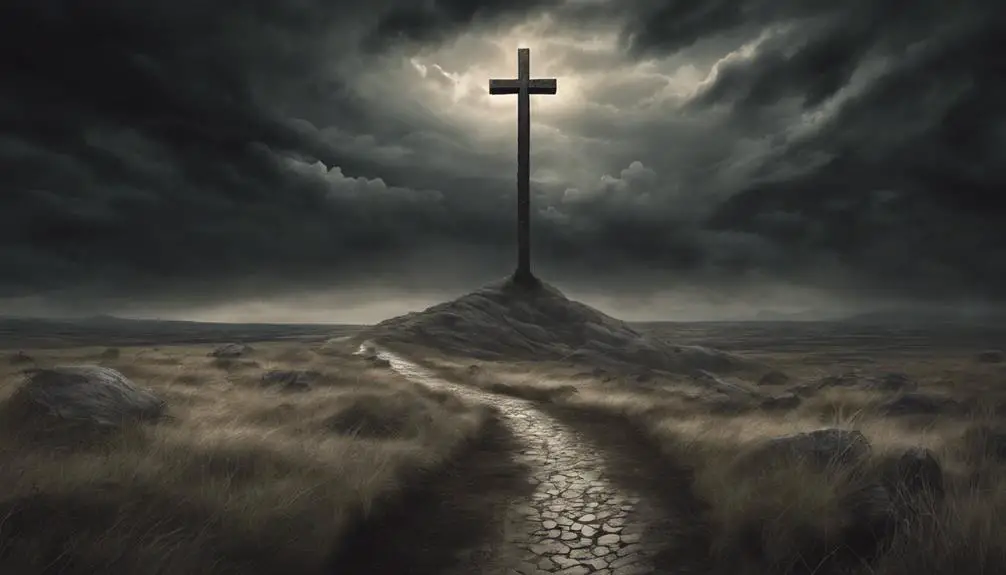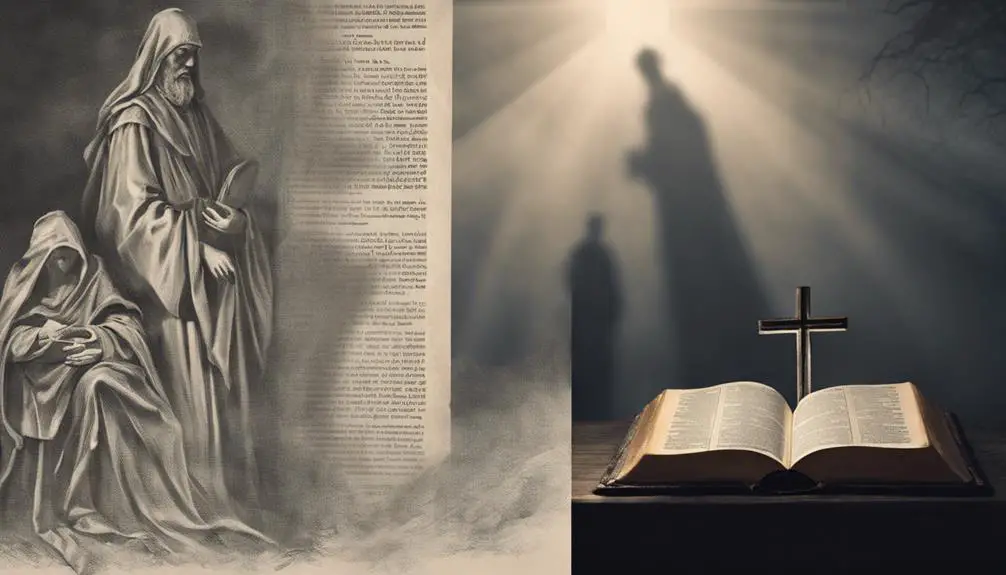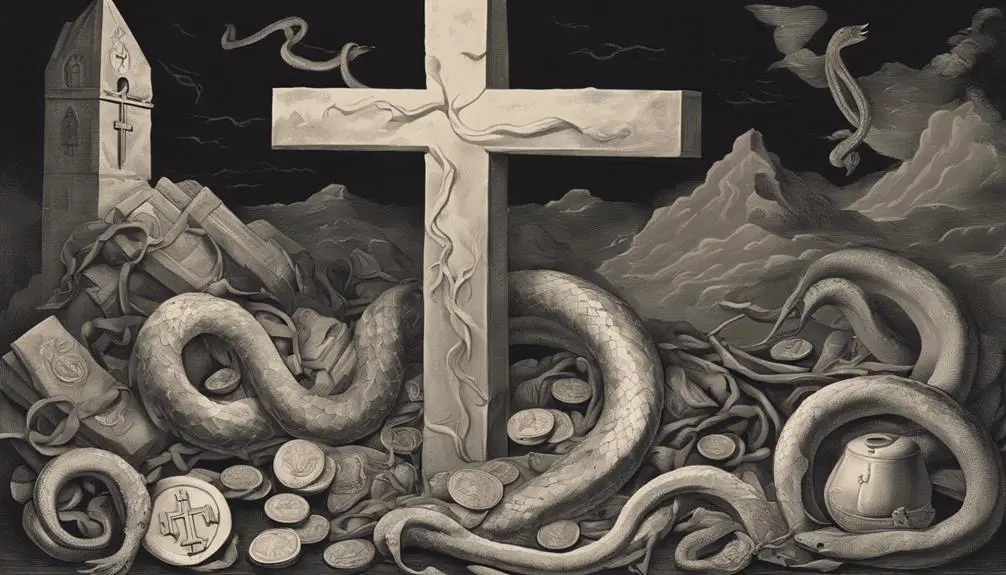Confront the enigmatic 'works of darkness' in the Bible, a term signifying actions deemed sinful or immoral in Christian teachings.

What Are the Works of Darkness in the Bible
Like a miner deciphering the value of the minerals in the earth, you might wonder about the term 'works of darkness' in the Bible.
This term, often shrouded in mystery, refers to actions and attitudes considered sinful or morally wrong according to Christian teachings.
So, if you're curious to explore these elements further, and to understand why they're given such a grave label, stick around. There's more to uncover that would surely pique your interest.
Key Takeaways
- Works of darkness in the Bible symbolize sin, evil, and spiritual blindness.
- Biblical figures like King David and Judas Iscariot committed dark deeds, resulting in severe consequences.
- Darkness in Christian doctrine represents sin, ignorance, and Satan's influence.
- Overcoming these dark works requires understanding, spiritual warfare, prayer, faith, and obedience to God.
Understanding 'Works of Darkness

What exactly are the 'Works of Darkness' as mentioned in the Bible? They're not just actions done under the cover of night, but rather symbolize deeds of evil and sin. In fact, darkness symbolism plays a central role in understanding this concept. This term is linked to the broader concept of spiritual darkness, which refers to the spiritual state of those who are separated from God due to sin.
You see, in Biblical literature, darkness is often used metaphorically to represent evil, sin, and separation from God. When you delve into the concept of 'Works of Darkness', you're exploring actions that are morally wrong, sinful, or contrary to God's will. It's about more than physical or literal darkness; it's a spiritual state of being. It's about living in ignorance, away from the divine light of God's truth and righteousness.
Understanding the 'Works of Darkness' requires an understanding of this spiritual darkness. It's about recognising that these works are actions that stem from a heart separated from God, living in spiritual obscurity. Hence, to comprehend this concept, you must delve deeper into the symbolism of darkness in the Bible.
Biblical References to Darkness

Throughout the Bible, there are numerous references to darkness, each serving to illustrate the profound spiritual implications of this metaphor. The symbolism of darkness is extensively used to represent sin, ignorance, and separation from God.
Here are four key biblical references to darkness:
- Genesis 1:2 – In the Creation story, darkness is present before God's creative acts, symbolizing the chaos and void that God brings order to.
- Exodus 10:21-23 – The Plague of Darkness, an act of judgement against Egypt, portrays darkness as a physical manifestation of spiritual blindness.
- Psalms 107:10 – The Psalmist uses darkness as a metaphor for those in rebellion against God's commands, illustrating their spiritual condition.
- Matthew 27:45 – The darkness that fell when Jesus was crucified signifies the weight of sin and the separation it causes from God.
Darkness in prophecy is also prevalent, often foretelling periods of judgement or spiritual decline. For instance, in Joel 2:2, the day of the Lord is described as a day of darkness and gloom. This usage of darkness underlines its role as a symbol of spiritual strife and divine judgement.
Examples of Dark Deeds

Ever considered how the Bible portrays dark deeds and their consequences? The Scriptures are replete with instances where deeds of darkness are enacted and the Shadow in Scriptures is a potent symbol of such acts. Your Darkness Symbolism Analysis wouldn't be complete without a dive into these examples.
Consider King David's adultery with Bathsheba and subsequent murder of Uriah. David's deeds, done in secret, symbolize the darkness of sin that can ensnare even those who are after God's heart. In the New Testament, Judas Iscariot's betrayal of Jesus Christ for thirty pieces of silver is another potent example.
Dark Deeds in the Bible |
Consequences |
|---|---|
David's Adultery & Murder |
Death of his child, family strife |
Judas's Betrayal |
Suicide, eternal damnation |
These examples paint a grim picture of the heavy toll of dark deeds. However, they also illuminate the Bible's abiding message: that such darkness can be overcome by God's mercy and forgiveness, if one truly repents. This theme continues to resonate in Christian doctrine and practice.
Darkness in Christian Doctrine

Shifting our focus to Christian doctrine, you'll find that the concept of darkness takes on profound significance, often symbolising sin, wickedness, and spiritual ignorance. The symbolism of darkness is complex, multi-layered, and deeply rooted in Biblical teachings.
Consider the following key points:
- Symbolism of Darkness – Darkness is often used as allegory for the sinful nature of mankind. It captures the essence of evil, corruption, and the absence of God's light.
- Light vs. Darkness – This dichotomy is a central theme in Christian doctrine. Light represents God, truth, and righteousness, while darkness stands for sin, deceit, and spiritual blindness.
- Darkness in the New Testament – Here, darkness is associated with ignorance of God and living a life apart from His teachings. It's also linked to Satan, the prince of darkness who tempts humans to sin.
- Apocalyptic Darkness – In the eschatological context, darkness signifies God's judgement on the wicked, as seen in the book of Revelation.
Understanding these aspects is crucial for a deeper comprehension of Christian theology. The concept of darkness challenges Christians to reflect on their spiritual journey, discerning between paths of light and paths of darkness.
Overcoming the Works of Darkness

In navigating your spiritual journey, understanding how to overcome the works of darkness can serve as a beacon of hope and a pivotal aspect of Christian living. You must appreciate the multifaceted nature of darkness symbolism in biblical texts, often representing sin, ignorance, and spiritual blindness.
Engaging in spiritual warfare requires fortitude and discernment. It's not merely a struggle against physical adversaries, but against principalities and powers in spiritual realms. The Bible emphasizes the importance of donning the whole armor of God for this purpose.
In Ephesians 6:11-18, Apostle Paul describes this armor as comprising truth, righteousness, the gospel of peace, faith, salvation, and the Word of God. These elements equip you to resist the devil's schemes, standing firm against evil forces.
Prayer is another powerful tool to overcome the works of darkness. It's your direct line of communication with God, allowing you to seek His guidance and strength. Remember, Christ's victory on the cross has already disarmed the powers of darkness. Therefore, your fight isn't for victory, but from victory. Remaining steadfast in faith and walking in obedience to God's word are key to overcoming the works of darkness.
Frequently Asked Questions
How Can Individuals Identify the 'Works of Darkness' in Their Personal Lives?
You can identify 'works of darkness' in your life through Darkness Identification Techniques. These involve personal spiritual reflection and discernment.
You'll need to critically examine your actions, thoughts, and motives. If you find elements rooted in selfishness, deceit, or harm to others, those are potential 'works of darkness'.
Understanding their presence allows you to consciously strive for change, aligning more closely with principles of love, truth, and selflessness.
How Are 'Works of Darkness' Dealt With in Other Religious Texts Outside of the Bible?
You're delving into comparative analysis and interfaith dialogue when you examine 'works of darkness' in religious texts outside the Bible. Each religion has its own interpretation of evil deeds.
For instance, Buddhism discusses 'unwholesome actions', while Hinduism talks about 'adharma'. You're not only expanding your understanding but also fostering respect for other faiths through this exploration.
It's intriguing to see the different perspectives on what constitutes 'dark' actions.
Are There Any Modern Interpretations of 'Works of Darkness' in Contemporary Christian Teachings?
Yes, there are modern interpretations of 'works of darkness' in contemporary Christian teachings. 'Darkness symbolism in Christianity' often signifies evil or sin. It's understood as actions that go against God's teachings.
The concept is deeply rooted in biblical texts, hence the phrase 'understanding biblical darkness.' It's not merely about literal darkness, but spiritual, moral, and ethical darkness. Today's preachers use it to illustrate the difference between godly and ungodly behaviors.
Can 'Works of Darkness' Be Linked to Mental Health Issues According to the Bible?
You're questioning if 'works of darkness' can be linked to mental health issues, as per the Bible.
It's key to understand that 'Darkness Depictions' in the scripture often refer to sinful behaviors rather than mental health conditions.
The Bible's 'Mental Health Scriptures' typically offer solace and support, not condemnation.
How Do Different Christian Denominations Interpret the 'Works of Darkness'?
Different Christian denominations often have interpretive variations when it comes to the 'works of darkness'. Some may see them as literal acts of evil, while others could interpret them metaphorically.
You'll find denominational differences in how these works are defined and addressed. It's essential you delve into specific theological teachings of each denomination to fully grasp their unique views on these biblical concepts.
Conclusion
In conclusion, you've explored the concept of 'works of darkness' within the Bible.
You've examined biblical references to darkness and pondered examples of dark deeds.
You've recognized the role of darkness in Christian doctrine.
Now, you're well-equipped to confront and overcome the works of darkness in your life.
It's crucial to remember that knowledge is power – understanding these biblical teachings can serve as a guiding light in your spiritual journey.



Sign up